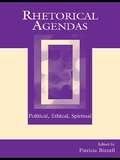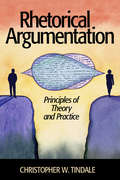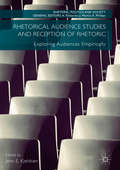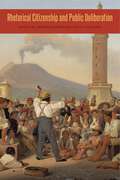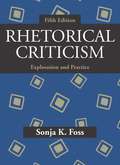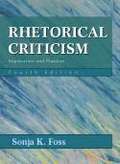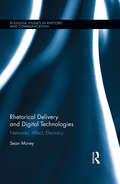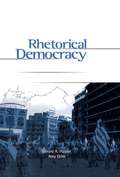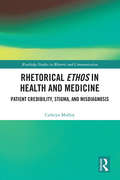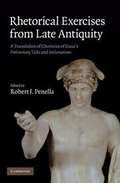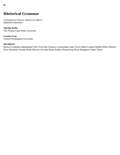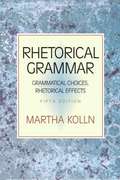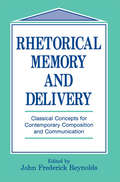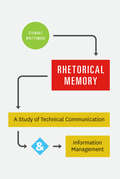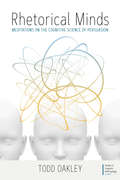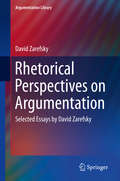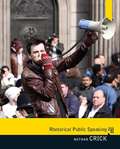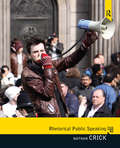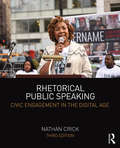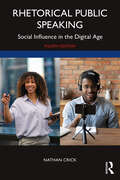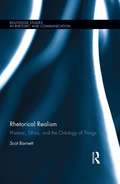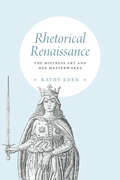- Table View
- List View
Rhetorical Agendas: Political, Ethical, Spiritual
by Patricia BizzellThis edited collection offers a broad consideration of contemporary rhetorical scholarship, tied to political, ethical, and spiritual themes. Originating from the 2004 conference of the Rhetoric Society of America, the contents of this volume reflects the conference themes of rhetorical agendas in current theory and research. The volume starts off with transcripts of the talks presented by the conference's featured speakers. The essays that follow are organized around five key topics: history, theory, pedagogy, publics, and gender. These chapters address subjects ranging from religious identity to civil rights; from weapons of mass destruction to literacy testing and electronic texts, reflecting the wide array of areas under study across the rhetoric discipline. With contributions from well-known scholars as well as newcomers, the breadth and diversity of this collection make a significant contribution to rhetorical scholarship, and will stimulate additional work. As such, the volume will be of interest to scholars and students in rhetoric studies in speech communication, English, and related disciplines.
Rhetorical Approaches to College Writing
by Chelsea A. Skelley Kathleen T. Leuschen Meghan McguireThe book is divided into four sections, each of which emphasizes a general framework within which to consider rhetoric. Rhetorical Foundations seeks to answer two questions: What are we studying, and why does it matter? Rhetorical Approaches examines various considerations we must make each time we communicate. Rhetorical Research offers strategies and rules of thumb for conducting responsible, effective, and comprehensive research to inform our opinions and support our arguments.
Rhetorical Argumentation: Principles of Theory and Practice
by Christopher W. TindaleThe study of argumentation has primarily focused on logical and dialectical approaches, with minimal attention given to the rhetorical facets of argument. Rhetorical Argumentation: Principles of Theory and Practice approaches argumentation from a rhetorical point of view and demonstrates how logical and dialectical considerations depend on the rhetorical features of the argumentative situation. Throughout this text, author Christopher W. Tindale identifies how argumentation as a communicative practice can best be understood by its rhetorical features.
Rhetorical Audience Studies and Reception of Rhetoric
by Jens E. KjeldsenThis book examines the reception of rhetoric and the rhetoric of reception. By considering salient rhetorical traits of rhetorical utterances and texts seen in context, and relating this to different kinds of reception and/or audience use and negotiation, the authors explore the connections between rhetoric and reception. In our time, new media and new forms of communication make it harder to distinguish between speaker and audience. The active involvement of users and audiences is more important than ever before. This project is based on the premise that rhetorical research should reconsider the understanding, conceptualization and examination of the rhetorical audience. From mostly understanding audiences as theoretical constructions that are examined textually and speculatively, the contributors give more attention to empirical explorations of actual audiences and users. The book will provide readers with new knowledge on the workings of rhetoric as well as illustrative and guiding examples of new methods of rhetorical studies.
Rhetorical Citizenship and Public Deliberation (Rhetoric and Democratic Deliberation)
by Christian Kock Lisa S. VilladsenCitizenship has long been a central topic among educators, philosophers, and political theorists. Using the phrase “rhetorical citizenship” as a unifying perspective, Rhetorical Citizenship and Public Deliberation aims to develop an understanding of citizenship as a discursive phenomenon, arguing that discourse is not prefatory to real action but in many ways constitutive of civic engagement. To accomplish this, the book brings together, in a cross-disciplinary effort, contributions by scholars in fields that rarely intersect. For the most part, discussions of citizenship have focused on aspects that are central to the “liberal” tradition of social thought—that is, questions of the freedoms and rights of citizens and groups. This collection gives voice to a “republican” conception of citizenship. Seeing participation and debate as central to being a citizen, this tradition looks back to the Greek city-states and republican Rome. Citizenship, in this sense of the word, is rhetorical citizenship. Rhetoric is thus at the core of being a citizen. Aside from the editors, the contributors are John Adams, Paula Cossart, Jonas Gabrielsen, Jette Barnholdt Hansen, Kasper Møller Hansen, Sine Nørholm Just, Ildikó Kaposi, William Keith, Bart van Klink, Marie Lund Klujeff, Manfred Kraus, Oliver W. Lembcke, Berit von der Lippe, James McDonald, Niels Møller Nielsen, Tatiana Tatarchevskiy, Italo Testa, Georgia Warnke, Kristian Wedberg, and Stephen West.
Rhetorical Citizenship and Public Deliberation: Rhetorical Citizenship And Public Deliberation (Rhetoric and Democratic Deliberation #3)
by Christian Kock Lisa VilladsenCitizenship has long been a central topic among educators, philosophers, and political theorists. Using the phrase “rhetorical citizenship” as a unifying perspective, Rhetorical Citizenship and Public Deliberation aims to develop an understanding of citizenship as a discursive phenomenon, arguing that discourse is not prefatory to real action but in many ways constitutive of civic engagement. To accomplish this, the book brings together, in a cross-disciplinary effort, contributions by scholars in fields that rarely intersect. For the most part, discussions of citizenship have focused on aspects that are central to the “liberal” tradition of social thought—that is, questions of the freedoms and rights of citizens and groups. This collection gives voice to a “republican” conception of citizenship. Seeing participation and debate as central to being a citizen, this tradition looks back to the Greek city-states and republican Rome. Citizenship, in this sense of the word, is rhetorical citizenship. Rhetoric is thus at the core of being a citizen. Aside from the editors, the contributors are John Adams, Paula Cossart, Jonas Gabrielsen, Jette Barnholdt Hansen, Kasper Møller Hansen, Sine Nørholm Just, Ildikó Kaposi, William Keith, Bart van Klink, Marie Lund Klujeff, Manfred Kraus, Oliver W. Lembcke, Berit von der Lippe, James McDonald, Niels Møller Nielsen, Tatiana Tatarchevskiy, Italo Testa, Georgia Warnke, Kristian Wedberg, and Stephen West.
Rhetorical Criticism: Exploration and Practice
by Sonja K. FossRhetorical criticism is an everyday activity we can use to understand our responses to symbols of all kinds and to create symbols of our own that generate the kinds of responses we intend. This book not only provides guidelines for understanding and practicing critical analysis but also conveys the excitement and fun that characterize the process.
Rhetorical Criticism: Exploration and Practice (4th Edition)
by Sonja K. Foss"Sonja Foss, who has an enviable talent for synthesizing complex rhetorical concepts and processes into clear explanations, presents nine methods of rhetorical criticism. She carefully explains and illustrates the theory behind each method with abundant examples of applications. Interesting and lively essays, some written by students, encourage readers to develop their critical skills. Useful bibliographies list additional samples for each type of criticism. " "Rhetorical criticism is not a process confined to a few assignments in a rhetorical or media criticism course. It is an everyday activity we can use to understand our responses to symbols of all kinds and to create our own symbols to generate the responses we desire. "--BOOK JACKET.
Rhetorical Criticism: Exploration and Practice 3rd edition
by Sonja K. Fossn the third edition of this highly regarded text, Sonja Foss continues the tradition of providing a comprehensive and comprehensible introduction to rhetorical criticism. She illustrates her discussion of foundational topics with a wide variety of well-chosen, engaging essays. Many of the essays new to this edition probe both familiar and unfamiliar ideologies looming in contemporary society. Foss’s clearly written introductions and the inclusion of student essays are appealing features for both undergraduate and graduate instruction. The final outcome of rhetorical criticism is a contribution to the improvement of our abilities as communicators and listeners.
Rhetorical Delivery and Digital Technologies: Networks, Affect, Electracy (Routledge Studies in Rhetoric and Communication #27)
by Sean MoreyThis book theorizes digital logics and applications for the rhetorical canon of delivery. Digital writing technologies invite a re-evaluation about what delivery can offer to rhetorical studies and writing practices. Sean Morey argues that what delivery provides is access to the unspeakable, unconscious elements of rhetoric, not primarily through emotion or feeling as is usually offered by previous studies, but affect, a domain of sensation implicit in the (overlooked) original Greek term for delivery, hypokrisis. Moreover, the primary means for delivering affect is both the logic and technology of a network, construed as modern, digital networks, but also networks of associations between humans and nonhuman objects. Casting delivery in this light offers new rhetorical trajectories that promote its incorporation into digital networked-bodies. Given its provocative and broad reframing of delivery, this book provides original, robust ways to understand rhetorical delivery not only through a lens of digital writing technologies, but all historical means of enacting delivery, offering implications that will ultimately affect how scholars of rhetoric will come to view not only the other canons of rhetoric, but rhetoric as a whole.
Rhetorical Democracy: Discursive Practices of Civic Engagement
by Gerard A. Hauser Amy GrimThis collection presents theoretical, critical, applied, and pedagogical questions and cases of publics and public spheres, examining these contexts as sources and sites of civic engagement. Reflecting the current state of rhetorical theory and research, the contributions arise from the 2002 conference proceedings of the Rhetoric Society of America (RSA). The collected essays bring together rhetoricians of different intellectual stripes in a multi-traditional conversation about rhetoric's place in a democracy. In addition to the wide variety of topics presented at the RSA conference, the volume also includes the papers from the President's Panel, which addressed the rhetoric surrounding September 11, 2001, and its aftermath. Other topics include the rhetorics of cyberpolitical culture, race, citizenship, globalization, the environment, new media, public memory, and more. This volume makes a singular contribution toward improving the understanding of rhetoric's role in civic engagement and public discourse, and will serve scholars and students in rhetoric, political studies, and cultural studies.
Rhetorical Ethos in Health and Medicine: Patient Credibility, Stigma, and Misdiagnosis (Routledge Studies in Rhetoric and Communication)
by Cathryn MolloyThis book explores rhetorical ethos and its ongoing role in patients’ credibility and in misdiagnoses stemming from gender, race and class-based biases. Drawing on the concept of ethos as a theoretical framework, it explores health and mental illness across different conditions and across different methodological approaches. Extending work on ethos in clinical encounters and public discourse about biomedicine and presenting new research on the rhetoric of mental health, stigma and mental illness, the book explores how bias in clinical settings can lead to symptoms labelled "in the patient’s head" masking treatable medical problems. This notable contribution to the rhetoric of health and medicine will be of interest to all researchers and graduate students of rhetoric and composition studies, rhetoric of health and medicine, disability studies, medical humanities, communication, and psychology.
Rhetorical Exercises From Late Antiquity: A Translation of Choricius of Gaza's Preliminary Talks and Declamations
by George A. Kennedy Robert J. Penella Eugenio Amato Malcolm Heath Terry L. Papillon William W. Reader D. A. Russell Simon SwainThe first translation, produced by a team of eight scholars, of the Declamations and Preliminary Talks of the sixth-century sophist Choricius of Gaza. Declamations, deliberative or judicial orations on fictitious themes, were the fundamental advanced exercises of the rhetorical schools of the Roman Empire, of interest also to audiences outside the schools. Some of Choricius' declamations are on generic themes (e.g. a tyrannicide, a war-hero), while others are based on specific motifs from Homeric times or from classical Greek history. The Preliminary Talks were typical prefaces to orations of all kinds. This volume also contains a detailed study of Choricius' reception in Byzantium and Renaissance Italy. It will be of interest to students of late antiquity, ancient rhetoric, and ancient education.
Rhetorical Grammar: Grammatical Choices, Rhetorical Effects
by Loretta Gray Martha KollnRhetorical Grammar encourages writers to recognize and use the grammatical and stylistic choices available to them, and to understand the rhetorical effects of those choices on their readers. Kolin and Gray ask students to regard sentence structure as a toolkit – and its application an artful way to elicit a desired emotion or reaction – rather than a list of tedious rules to remember. In this way, grammar is defined as an intellectual exercise that opens students' minds to the versatility, beauty, and possibilities of language. <p><p>The Eighth Edition offers a more intuitive content organization, updated passage selections, and current exercises and examples. It maintains its hallmark revision strategies and systematic discussions about reader expectations, sentence rhythm and cohesion, subordination and coordination, punctuation, modification, diction, and many other essential principles.
Rhetorical Grammar: Grammatical Choices, Rhetorical Effects
by Martha KollnThis detailed guide encourages writers to recognize and use the grammatical and stylistic choices available to them and to understand the rhetorical effects those choices can have on their readers.
Rhetorical Memory and Delivery: Classical Concepts for Contemporary Composition and Communication (Routledge Communication Series)
by John Frederick ReynoldsWhy has classical rhetoric been a subject of such growing interest for the past ten years? Because the most exciting work in classical rhetoric has asked us to rethink classical concepts in modern terms. What's been missing, at least in book-length form, is a scholarly rethinking of rhetorical memory and delivery. As many scholars have been noting in their work for some time now, three of five classical issues -- invention, arrangement, and style -- have dominated rhetorical studies while the other two -- memory and delivery -- have largely been misunderstood or ignored. Re-examined in light of recent research on orality, literacy, and electronic technology, rhetorical memory and delivery issues can become not only central to the field but also key to the continued interest in classical rhetoric. Bringing together national scholars from a variety of related disciplines in which rhetorical memory and delivery issues matter, this collection is the only volume that examines classical and contemporary interpretations of rhetorical memory and delivery in depth and detail.
Rhetorical Memory: A Study of Technical Communication and Information Management
by Stewart WhittemoreInstitutions have regimes--policies that typically come from the top down and are meant to align the efforts of workers with the goals and mission of an institution. Institutions also have practices--day-to-day behaviors performed by individual workers attempting to interpret the institution's missives. Taken as a whole, these form a company's memory regime, and they have a significant effect on how employees analyze, mix, translate, sort, filter, and repurpose everyday information in order to meet the demands of their jobs, their customers, their colleagues, and themselves. In Rhetorical Memory, Stewart Whittemore demonstrates that strategies we use to manage information--techniques often acquired through trial and error, rarely studied, and generally invisible to us--are as important to our success as the end products of our work. First, he situates information management within the larger field of rhetoric, showing that both are tied to purpose, audience, and situation. He then dives into an engaging and tightly focused workplace study, presenting three cases from a team of technical communicators making use of organizational memory during their everyday work. By examining which techniques succeed and which fail, Whittemore illuminates the challenges faced by technical communicators. He concludes with a number of practical strategies to better organize information, that will help employees, managers, and anyone else suffering from information overload.
Rhetorical Minds: Meditations on the Cognitive Science of Persuasion (Studies in Linguistic Anthropology #1)
by Todd OakleyMinds are rhetorical. From the moment we are born others are shaping our capacity for mental agency. As a meditation on the nature of human thought and action, this book starts with the proposition that human thinking is inherently and irreducibly social, and that the long rhetorical tradition in the West has been a neglected source for thinking about cognition. Each chapter reflects on a different dimension of human thought based on the fundamental proposition that our rhetoric thinks and acts with and through others.
Rhetorical Perspectives on Argumentation
by David ZarefskyThis book contains 20 essays tracing the work of David Zarefsky, a leading North American scholar of argumentation from a rhetorical perspective The essays cohere around 4 general themes: objectives for studying argumentation rhetorically, approaches to rhetorical study of argumentation, patterns and schemes of rhetorical argumentation, and case studies illustrating the potential of studying argumentation rhetorically These articles are drawn from across Zarefsky's 45-year career. Many of these articles originally appeared in publications that are difficult to access today, and this collection brings the reader up to date on the topic. Zarefsky's scholarship focuses on the role of language in political argumentation, the ways in which argumentation creates public knowledge and belief, the influence of framing and context on what is said and understood, the deployment of particular patterns and schemes of argumentation in public reasoning, and the influence of debate on politics and governance. All these topics are addressed in this book. Each of the conceptual essays includes brief application to specific cases, and five extended case studies are also presented in this volume. The case studies cover different themes: two explore famous political debates, the third focuses on presidential rhetoric across the course of United States history, the fourth on the arguments for liberalism at a time of political polarization, and the fifth on the contemporary effort to engage the United States with the Muslim world. This book is of interest to scholars in the fields of philosophy, logic, law, philosophy of law, and legal history. The range of topics and concepts addressed, the interplay of concepts and cases and the unifying perspective of rhetorical argumentation make this book a valuable read for students of argumentative practice, whether rhetorically or otherwise.
Rhetorical Public Speaking
by Nathan CrickOffers students an advanced approach to public speaking through a comprehensive discussion of rhetorical theory This text begins by addressing Aristotle's "Five Canons of the Art"-a means of covering the basics through the lens of rhetorical theory- and progresses into a sophisticated outline of understanding, constructing and delivering artful rhetoric. The book incorporates scholarship on mediated communication, pragmatic speaking genres, the rhetorical situation, and aesthetic form. Rhetorical Public Speaking aims to encourage students to be engaged citizens of society. This text is available in a variety of formats - print and digital. Check your favorite digital provider for your etext, including Coursesmart, Kindle, Nook, and more. To learn more about our programs, pricing options and customization, click the Choices tab. Learning Goals Upon completing this book, readers will be able to: Understand Aristotle's Five Canons of Rhetoric Construct and execute speeches Explore how they can use rhetorical speech in their daily lives 0205943586 / 9780205943586 Rhetorical Public Speaking Plus MySearchLab with Pearson eText -- Access Card Package Package consists of: 0205239927 / 9780205239924 MySearchLab with Pearson eText -- Valuepack Access Card 020586936X / 9780205869367 Rhetorical Public Speaking
Rhetorical Public Speaking
by Nathan CrickOffers students an advanced approach to public speaking through a comprehensive discussion of rhetorical theory This text begins by addressing Aristotle's "Five Canons of the Art"-a means of covering the basics through the lens of rhetorical theory- and progresses into a sophisticated outline of understanding, constructing and delivering artful rhetoric. The book incorporates scholarship on mediated communication, pragmatic speaking genres, the rhetorical situation, and aesthetic form. Rhetorical Public Speaking aims to encourage students to be engaged citizens of society. Upon completing this book, readers will be able to: Understand Aristotle's Five Canons of Rhetoric Construct and execute speeches Explore how they can use rhetorical speech in their daily lives
Rhetorical Public Speaking: Civic Engagement in the Digital Age
by Nathan CrickRhetorical Public Speaking: Civic Engagement in the Digital Age, Third Edition offers students an innovative approach to public speaking by employing the rhetorical canon as a means of constructing artful speech in a multi-mediated environment. It provides a foundation to guide students in understanding, constructing, and delivering messages that address matters of public concern. This edition features contemporary as well as historical examples to highlight key concepts and show how rhetoric works in practice. Each chapter includes speech excerpts, summaries, and exercises for review and retention. Students of public speaking are encouraged to employ their new skills as engaged citizens of society.
Rhetorical Public Speaking: Social Influence in the Digital Age
by Nathan CrickThis textbook offers an innovative approach to public speaking by employing the rhetorical canon as a means of constructing artful speech in a multi-mediated environment. By stressing how contemporary public speaking continues the classical art of persuasion, this book provides a foundation to guide students in constructing and delivering messages that address matters of concern and interest to their audience. This edition features contemporary as well as historical examples to highlight key concepts and show how rhetoric works in practice. It not only emphasizes the traditional skills of face-to-face oratory, but it also includes a chapter solely dedicated to highlighting the techniques and tactics of digital social influencing that adapts public speaking to online platforms. Each chapter includes speech excerpts, summaries, and exercises for review and retention. This textbook for courses in public speaking and rhetoric will particularly appeal to instructors wishing to foreground speaking as engaged citizens on public and political issues. Online resources include an instructor’s manual with discussion and test questions, video links, and sample materials.
Rhetorical Realism: Rhetoric, Ethics, and the Ontology of Things (Routledge Studies in Rhetoric and Communication)
by Scot BarnettRhetorical Realism responds to the surging interest in nonhumans across the humanities by exploring how realist commitments have historically accompanied understandings of rhetoric from antiquity to the present. For a discipline that often defines itself according to human speech and writing, the nonhuman turn poses a number of challenges and opportunities for rhetoric. To date, many of the responses to the nonhuman turn in rhetoric have sought to address rhetoric’s compatibility with new conceptions of materiality. In Rhetorical Realism, Scot Barnett extends this work by transforming it into a new historiographic methodology attuned to the presence and occlusion of things in rhetorical history. Through investigations of rhetoric’s place in Aristotelian metaphysics, the language invention movement of the seventeenth century, and postmodern conceptions of rhetoric as an epistemic art, Barnett’s study expands the scope of rhetorical inquiry by showing how realist ideas have worked to frame rhetoric’s scope and meanings during key moments in its history. Ultimately, Barnett argues that all versions of rhetoric depend upon some realist assumptions about the world. Rather than conceive of the nonhuman as a dramatic turning point in rhetorical theory, Rhetorical Realism encourages rhetorical theorists to turn another eye toward what rhetoricians have always done—defining and configuring rhetoric within a broader ontology of things.
Rhetorical Renaissance: The Mistress Art and Her Masterworks
by Kathy EdenKathy Eden reveals the unexplored classical rhetorical theory at the heart of iconic Renaissance literary works. Kathy Eden explores the intersection of early modern literary theory and practice. She considers the rebirth of the rhetorical art—resulting from the rediscovery of complete manuscripts of high-profile ancient texts about rhetoric by Plato, Aristotle, Cicero, Quintilian, and Tacitus, all unavailable before the early fifteenth century—and the impact of this art on early modern European literary production. This profound influence of key principles and practices on the most widely taught early modern literary texts remains largely and surprisingly unexplored. Devoting four chapters to these practices—on status, refutation, similitude, and style—Eden connects the architecture of the most widely read classical rhetorical manuals to the structures of such major Renaissance works as Petrarch’s Secret, Castiglione’s Book of the Courtier, Erasmus’s Antibarbarians and Ciceronianus, and Montaigne’s Essays. Eden concludes by showing how these rhetorical practices were understood to work together to form a literary masterwork, with important implications for how we read these texts today.
